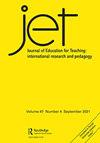The relationship between informal teacher learning and self-efficacy among public school teachers and private school teachers in China
IF 1.7
3区 教育学
Q2 EDUCATION & EDUCATIONAL RESEARCH
引用次数: 2
Abstract
ABSTRACT Although informal teacher learning (ITL) has been deemed critical for teachers in various contexts, it remains unknown how different kinds of ITL are associated with teacher self-efficacy, and how these relationships differ between public school teachers and private school teachers. Based on sociocultural theory and reflection theory, this study first categorised ITL activities into four types: (1) learning through interaction with colleagues, (2) learning through interaction with stakeholders (i.e. students, parents, friends, and researchers), (3) learning through interaction with multimedia, and (4) learning through reflection on practice. Borrowing from social cognitive theory, the study then investigated the relationship between each type of ITL and teacher self-efficacy among public school teachers and private school teachers. Survey responses were collected from 289 teachers in a pilot study and 510 teachers in the main study. Multigroup structural equation modelling was used to analyse the data. The results substantially support the existence of the four ITL categories listed above. Compared with the private school teachers, the public school teachers reported that they interacted more with stakeholders. The public school teachers’ reflection on practice was significantly related to their self-efficacy, whereas the private school teachers’ interaction with stakeholders and multimedia was important to their self-efficacy.中国公办和民办学校教师非正式教师学习与自我效能感的关系
尽管非正式教师学习(ITL)被认为在各种情境下对教师至关重要,但不同类型的非正式教师学习如何与教师自我效能感相关,以及这些关系在公立学校教师和私立学校教师之间有何不同,目前尚不清楚。基于社会文化理论和反思理论,本研究首先将ITL活动分为四种类型:(1)通过与同事的互动学习;(2)通过与利益相关者(即学生、家长、朋友和研究人员)的互动学习;(3)通过与多媒体的互动学习;(4)通过对实践的反思学习。随后,本研究借鉴社会认知理论,考察了公立学校教师和私立学校教师各类型ITL与教师自我效能感的关系。调查问卷收集了289名教师在试点研究和510名教师在主要研究。采用多组结构方程模型对数据进行分析。结果基本上支持上面列出的四类国际图册的存在。与私立学校教师相比,公立学校教师报告他们与利益相关者的互动更多。公立学校教师对实践的反思与自我效能感显著相关,私立学校教师与利益相关者和多媒体的互动对自我效能感有显著影响。
本文章由计算机程序翻译,如有差异,请以英文原文为准。
求助全文
约1分钟内获得全文
求助全文
来源期刊

Journal of Education for Teaching
EDUCATION & EDUCATIONAL RESEARCH-
CiteScore
10.50
自引率
10.00%
发文量
61
期刊介绍:
The Journal of Education for Teaching is an established international refereed periodical which publishes original contributions on the subject of teacher education. The journal interprets "teacher education" in the widest sense, to include initial training, in-service education and staff development. The editors welcome scholarly discussions of new issues, reports of research projects or surveys of research work in particular fields, and contributions to current debates in teacher education throughout the world, generally or on specific issues.
 求助内容:
求助内容: 应助结果提醒方式:
应助结果提醒方式:


